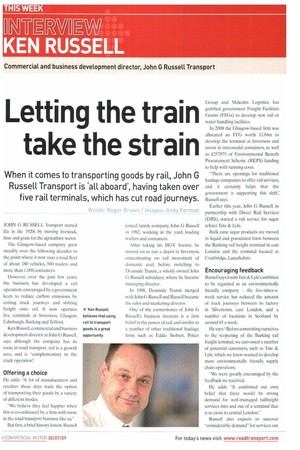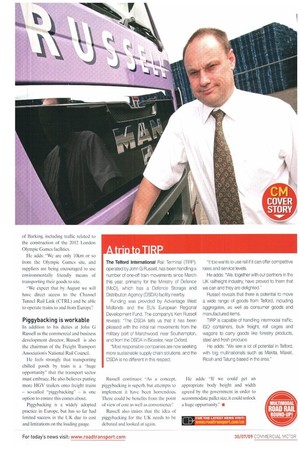Letting the train take the strain
Page 18

Page 19

If you've noticed an error in this article please click here to report it so we can fix it.
When it comes to transporting goods by rail, John G Russell Transport is 'all aboard', having taken over five rail terminals, which has cut road journeys.
Words: Roger Brown / Images: Andy Forman
JOHN G RUSSELL Transport started life in the 1920s by moving livestock, lime and grain for the agriculture sector.
The Glasgow-based company grew steadily over the following decades to the point where it now runs a road fleet of about 180 vehicles, 500 trailers and more than 1,000 containers.
However, over the past few years, the business has developed a rail operation, encouraged by a government keen to reduce carbon emissions by cutting truck journeys and shifting freight onto rail. It now operates five terminals at Inverness. Glasgow, Edinburgh, Barking and Telford.
Ken Russell,commercial and business development director at John G Russell, says although the company has its roots in road transport, rail is a growth area, and is "complementary to the truck operation':
Offering a choice
He adds: "A lot of manufacturers and retailers these days want the option of transporting their goods by a variety of different modes.
"We believe they feel happier when this is co-ordinated by a firm with roots in the road transport business like us."
But first, a brief history lesson. Russell joined family company John G Russell in 1982, working in the yard, loading trailers and containers.
After taking his HGV licence, he moved on to run a depot in Inverness, concentrating on rail movement of domestic coal, before switching to Deanside Transit, a wholly owned John G Russell subsidiary, where he became managing director.
In 1998, Deanside Transit merged with John G Russell and Russell became the sales and marketing director.
One of the cornerstones of John G Russell's business interests is a firm belief in the power of rail, and similar to a number of other traditional haulage firms such as Eddie Stobart, Potter Group and Malcolm Logistics, has grabbed government Freight Facilities Grants (FECis) to develop new rail or water handling facilities.
In 2008 the Glasgow-based firm was allocated an FFG worth 11.84m to develop the terminal at Inverness and invest in intermodal containers, as well as £257,975 of Environmental Benefit Procurement Scheme (REPS) funding to help with running costs.
'There are openings for traditional haulage companies to offer rail services, and it certainly helps that the government is supporting this shift': Russell says.
Earlier this year, John G Russell. in partnership with Direct Rail Services (DRS), started a rail service for sugar refiner Tate & Lyle.
Bulk cane sugar products are moved in liquid and granulated form between the Barking rail freight terminal in east London and the terminal located at Coatbridge, Lanarkshire.
Encouraging feedback
Russell says it suitsTate & Lyle's ambition to be regarded as an environmentally friendly company the five-times-aweek service has reduced the amount of truck journeys between its factory in Silvertown, east London, and a number of locations in Scotland by around 65 a week.
He says:"Before committing ourselves to the reopening of the Barking rail freight terminal, we canvassed a number of potential customers, such as Tate & Lyle, which we knew wanted to develop more environmentally friendly supply chain operations.
"We were greatly encouraged by the feedback we received.
He adds: "It confirmed our own belief that there would be strong demand for well-managed railfreight services into and out of a terminal that is so close to central London.
Russell also expects . to uncover "considerable demand" for services out of Barking, including traffic related to the construction of the 2012 London Olympic Games facilities.
He adds: "We are only 10km or so from the Olympic Games site, and suppliers are being encouraged to use environmentally friendly means of transporting their goods to site.
"We expect that by August we will have direct access to the Channel Tunnel Rail Link (CTRL) and be able to operate trains to and from Europe':
Piggybacking is workable
In addition to his duties at John G Russell as the commercial and business development director, Russell is also the chairman of the Freight Transport Association's National Rail Council.
He feels strongly that transporting chilled goods by train is a "huge opportunity" that the transport sector must embrace. He also believes putting more HGV trailers onto freight trains — so-called "piggybacking— is one option to ensure this comes about.
Piggybacking is a widely adopted practice in Europe, but has so far had limited success in the UK due to cost and limitations on the loading gauge. Russell continues: "As a concept, piggybacking is superb, but attempts to implement it have been horrendous. There could be benefits from the point of view of cost as well as convenience': Russell also insists that the idea of piggybacking for the UK needs to he debated and looked at again. He adds: "If we could get an appropriate body height and width agreed by the government in order to accommodate pallet size, it could unlock a huge opportunity." •












































































































































